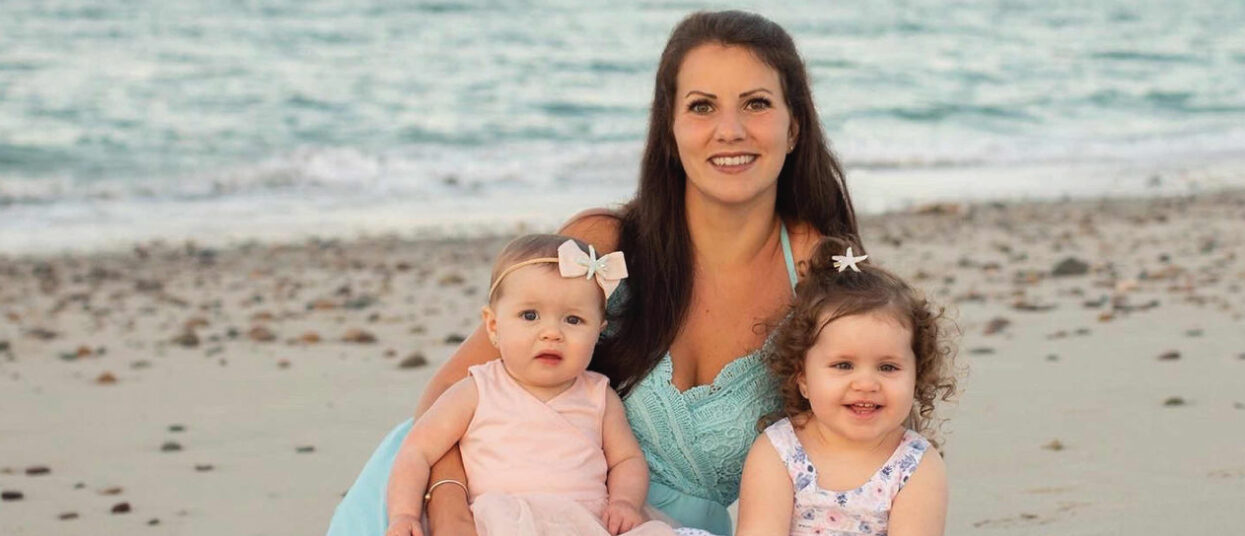An Inspiring Journey to Motherhood
Elisabeth Youngclaus was a nursing school student when she unexpectedly learned she may have a heart rhythm disorder, also called an arrhythmia.
It would take years to get an accurate diagnosis: arrhythmogenic cardiomyopathy. This condition occurs when the electrical signals to the heart don’t fire properly. Without treatment, it can cause erratic heart rhythms that can lead to sudden death.
Elisabeth started her nursing career in the South and initially doctors there attributed the odd heartbeats to stress, caffeine, or an undetected childhood viral infection. She tried various treatments that were unsuccessful. When one doctor told her to “wait and see” what happens, Elisabeth had enough. She was done waiting. She wanted answers.
Brigham team evaluates potential causes of arrythmia
Elisabeth moved back to her home state of Massachusetts in 2017. She was referred to Brigham and Women’s Hospital and hoped the doctors could solve her health mystery.
Sunil Kapur, MD, a Mass General Brigham electrophysiologist, reviewed a new MRI that showed existing scar tissue in her heart had increased. Those results disproved one theory that the scar tissue came from a childhood illness. An EKG also revealed Elisabeth’s erratic heartbeats were increasing over time. Dr. Kapur performed an ablation to address the irregular heartbeats. This procedure uses heat or intense cold to destroy very small areas of heart tissue that are causing heart rhythm problems. Destroying this tissue can help restore a normal heart rhythm.
Dr. Kapur also referred her to Neal Lakdawala, MD, a Mass General Brigham cardiologist with expertise in cardiovascular genetics.

Unlikely clues: DSP gene linked to heart condition
Dr. Lakdawala asked Elisabeth routine medical questions. But their first conversation took an unexpected turn when he asked if her hair color and texture were natural, and if she had calluses on her hands and feet.
“The questions started to get weird,” Elisabeth recalls. “I thought, ‘Where is he going with this?'”
When Elisabeth pointed out that her dark hair, styled straight that day, was naturally curly and she’s had calluses on her feet since childhood—an affliction her mother attributed to Irish step dancing lessons—it confirmed the doctor’s suspicions.
As Dr. Lakdawala explained to Elisabeth, one gene that is responsible for those same genetic traits may be linked to her heart problems. This DSP gene holds the instructions for making the protein desmoplakin, which is found primarily in heart and skin cells. The DSP gene mutation is also found in patients with Elisabeth’s heart condition.
A lifesaving diagnosis: Arrhythmogenic cardiomyopathy
When the DSP gene mutation showed up in Elisabeth’s genetic tests, Dr. Lakdawala quickly adjusted her treatment plan. Dr. Kapur also implanted a defibrillator as a safety net in case her heart goes into a dangerous rhythm in the future.
“It was really reassuring to finally have an answer,” Elisabeth says. “To be put in the hands of Brigham and Women’s Cardiology and have them advocate for me was just such a relief. We were so lucky to be in their care.”
Genetic Testing for a Healthy Pregnancy
For a young woman looking to start a family, two looming questions remained: Would pregnancy put a strain on Elisabeth’s heart? And would she pass this gene mutation along to her children?
Nadine Channaoui, MS, CGC, a Mass General Brigham genetic counselor, and Dr. Lakdawala explained that there would be a 50 percent chance of passing the genetic mutation to a child. These odds could be reduced if she used an implanted egg that did not contain the defect. Given the strong genetic link, Dr. Lakdawala also recommended testing for Elisabeth’s immediate family members.
He referred Elisabeth to Katherine Economy, MD, a Mass General Brigham maternal-fetal medicine specialist. Through the Brigham’s Center for Cardiac Disease and Pregnancy, a team of experts created a plan for in vitro fertilization (IVF). They followed Elisabeth’s pregnancy closely and provided very careful and coordinated care during labor and delivery. Elisabeth’s daughter Amelia was born healthy.
“Dr. Lakdawala now sees another member of my family and is keeping an eye out for any other family members who could potentially have the same genetic condition,” says Elisabeth. It’s nice to know that it’s not just my doctor taking care of me, it’s a team of doctors taking care of my whole family.”
Navigating a Second Pregnancy and Heart Failure
Following Amelia’s birth, Elisabeth had a second spontaneous pregnancy. She underwent genetic testing at the Brigham and learned the baby did not carry the DSP gene mutation. The Brigham team, led by Drs. Economy and Lakdawala, again monitored Elisabeth’s pregnancy closely for complications and tailored care to her condition.
Elisabeth developed heart failure at the end of her pregnancy and had to be induced because of it. “We urgently pulled together teams from maternal-fetal medicine, anesthesia, cardiology, and nursing to quickly care for Elisabeth and bring Mackenzie safely into the world,” explains Dr. Economy.
“It was incredibly scary, but I was once again in the best hands possible for my delivery,” Elisabeth says. “I’m extremely lucky and grateful to have my little miracle Mackenzie!”
Thriving as a Mother of Two
After overcoming many health challenges, Elisabeth’s experiences have only deepened her commitment to wellness. With Dr. Lakdawala’s support, she’s now active at CrossFit, working to improve her strength and endurance.